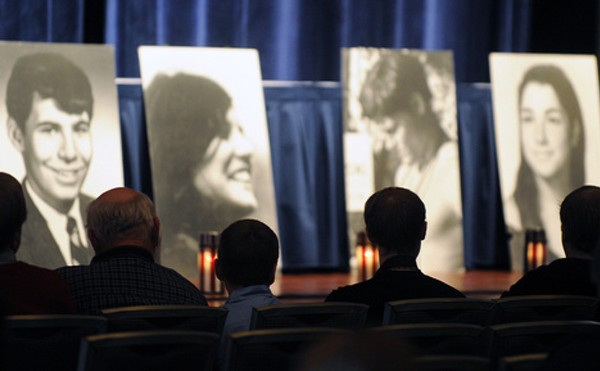Mayor Greg Fischer has a profound political vulnerability — Police Chief Steve Conrad.
The issues facing the Louisville Metro Police Department are real and concerns over Conrad’s ability to lead the department and city through troubling times are valid. And the chief reports directly to the mayor.
Although it has no power to remove the chief, the Metro Council has expressed bi-partisan disapproval through a no-confidence vote.
The Fraternal Order of Police, the men and women on the job for this city, voted overwhelmingly in its disapproval of their chief.
Are there enough police officers? Over 99 percent say? “No.”
Does the chief appropriately and efficiently assign/utilize officers? Over 99 percent: “No.”
Do officers have confidence in Conrad’s leadership? Over 98 percent: “No.”
Then, there is the Explorer Scout Program sexual assault scandal... and the misused, wasted anti-violence funds, half of which were drained in just six weeks.
Most important, though — violent crimes and homicides continue at crisis-levels.
The social dominoes that led Louisville to this era of violence make it impossible to draw a clear line from cause to result — it is no single person or institution’s failure — and any path to resolution will be long and challenging.
But change isn’t coming fast enough.
Every week, two more people are killed and families are irreparably broken, while a similar number of lives are lost to the criminal justice system. Recently, Conrad reported to the Metro Council 354 shootings so far this year and 105 homicides — a person every three and a half days.
Last year, Louisville suffered a record 434 shootings and 123 homicides — almost one person killed every three days.
Can that be called an improvement?
Statistically, sure. But if you’re measuring cost in lives lost and total damage to the city… I’d argue things are worse.
Why worse? By arguing improvement you gloss over the ongoing severity of the crisis, which makes our city worse. To accept 2017’s mass casualties as improvement is essentially to accept a certain loss of life — it devalues the life of each victim.
Consecutive years of violence also proves our city is still unsafe. It indicates our city leadership isn’t prepared treat an emergency like an emergency.
Louisville violence isn’t Chief Conrad’s fault, but it is his problem. And when the city allocated emergency funds to combat the violence, it now appears as though it was wasted, or at least mismanaged.
Last December, Conrad received $6.2 million in emergency anti-violence funds, including $1.2 million for additional overtime. The supplemental overtime funding was supposed to last over six months, but the department had spent more than half of it in the first six weeks.
A WDRB investigation found that a handful of officers were working 17-hour days, or longer, totaling hundreds of hours of overtime. This was not their fault — there is no policy to limit overtime.
The emergency funds proved ineffective, as violent crime actually increased during this period, WDRB concluded.
Moreover, this occurred as the consensus across Metro government was for hiring and training more officers. Instead, money was used ineffectively on a few officers. And that is Conrad’s fault.
Then, there is the Explorer Scout saga — a story of sexual assault and abuse of power. The whole city still hopes to find out who in the police department and perhaps the Mayor’s Office knew what, when they knew it and whether the scandal was covered up.
This is a sex scandal of the most heinous kind. Male police officers, people of power, supposedly trusted mentors, are accused of sexually assaulting teenage boys and girls who were part of a city program for kids interested in law enforcement careers.
It makes one wonder: If this story first broke today — post-Harvey Weinstein, Kevin Spacey, Roy Moore, Matt Lauer — would the public be as patient for justice? Or would public outcry and #MeToo call for major, immediate action?
Would the police chief still have a job?
Public safety is the overriding responsibility of the chief of police and his boss, the mayor. Neither Conrad or Fischer is responsible for these problems but, ultimately, they are responsible for the results.
While politics shouldn’t be considered with public safety, going into an election year, the evidence is mounting that Conrad isn’t just a political liability.
Fischer needs to ask himself if 2018 is the year he takes bold action, or risk a year of stories including violence and a sex scandal in his police department.






